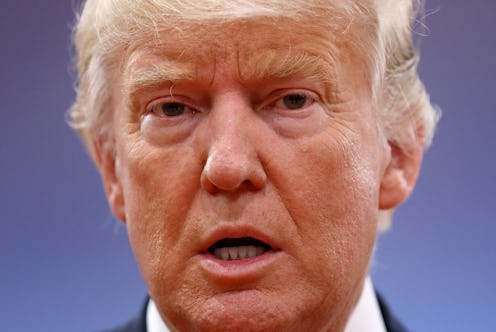News
Here’s What The Midterm Elections Could *Actually* Mean For Trump

Think of the midterm elections as a performance review. They fall halfway into a president’s four-year term, so they’re a great way to find out whether voters like what the government is doing or whether they want change. So if voters overwhelmingly elect Democrats in the midterms, that means President Trump's popularity and effectiveness are being called into question. But if voters elect more Republicans to office, that's a sign they’re on board with the White House’s agenda, or at least that they don’t want to make things any harder for Trump.
In 2014, Republicans regained control of Congress from Democrats, and conservative pundits like the late Charles Krauthammer, a political columnist, argued that result was a direct reflection on how Americans felt about former President Obama’s “ideology and the execution of his policies.” So, it’s fair to say that if Democrats retake control of either chamber of Congress this year, you can expect to hear a lot from the talking heads on cable news about how those results are a direct response to Trump’s policies.
You also might remember hearing about congressional gridlock when Obama was in office. That's exactly what it sounds like: When Congress refuses to pass laws or work with other parts of the government, primarily the president, it can bring the work of the federal government to a screeching halt.
Right now, the Republican Party has control of the White House and Congress, and it's had a heavy hand in shaping the federal courts as well. That means Republicans can pass the policies they want without compromising with Democratic politicians at all. But if Democrats take control of Congress, Republicans will need to compromise in order to get bills passed, and Democrats will be able to act as a check on the White House.
That sounds like a pretty big deal. Is any of this likely to happen?
Well, the president’s party historically doesn’t do too well in midterm elections, as noted by Politifact, a non-partisan fact-checking website. And several "generic ballot" polls, which ask about "Democratic" and "Republican" candidates generally and don't name any particular candidate, also showed Democrats with a more than 10-point lead over Republicans in the midterms as of mid-September.
But Democrats have to defend a number of seats before they can win a majority in both houses of Congress and act as that check on the president. We won’t get too far into the actual numbers here, but there are a lot of factors at play.
What’s the biggest possible consequence of the midterms for Trump?
One word: impeachment. Even Trump's own personal lawyer, Rudy Giuliani, said the midterm "election is going to be about impeachment or no impeachment," telling a crowd at the beginning of August that impeachment proceedings could move forward if Democrats gain control of the House.
First, let’s do a quick walkthrough of how impeachment works. The House must vote on one or more articles of impeachment. These are basically a drafted set of charges against an elected official — in this theoretical case, the president. If at least one of those articles gets a majority of votes, then the impeachment proceedings move to the Senate. There, the impeachment proceedings more closely resemble a trial. A group of members from the House, who are then called managers, present the case for the prosecution, and the official being impeached can bring in their own lawyers to present a defense. Then the Senate, who plays the jury’s role, votes on whether to convict the official.
If two-thirds of the Senate votes to convict, then the official is removed from office. In that case, the president would be removed from the White House, and the vice president would take over as president.
So are Democrats planning to move forward on impeachment if they do well in the midterms?
Well, House Minority Leader Nancy Pelosi (D-CA), the top Democrat in the House of Representatives, said in May that she has “hesitated to use impeachment” of Trump as a talking point. “There is an investigation. If it takes its course, let it take its course,” Pelosi said during a CNN town hall. “But I do not think that impeachment is a policy agenda.”
In fact, Republicans are talking about impeachment more than Democrats, according to a recent FiveThirtyEight analysis. A number of Republican officials and candidates are using this specter of impeachment to drive voters to the polls. And in the end, who knows? Depending on what happens in November, Democrats may decide to focus more on impeachment as a political goal — or Republicans may retain control of the House and ward off the possibility. Ultimately that all depends on who wins the midterms, and that depends on who votes.